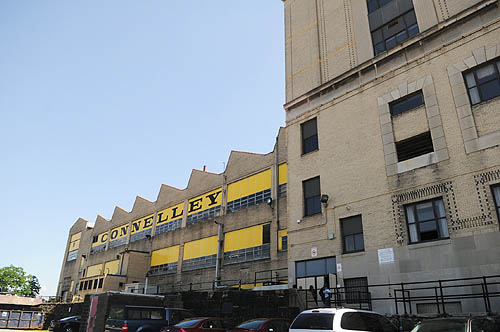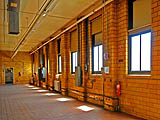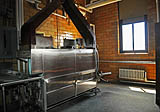
Former School to Become Green Center

The old Connelly Technical Institute is planned to be used as a business incubator.
The 80-year-old former Connelley Technical Institute in the Hill District is slated to become a green technology demonstration showcase under the ownership of Pittsburgh Green Innovators Inc.
PGI has a sales agreement with Pittsburgh Public Schools and expects to close this summer and begin retooling the former vocational school by fall, said Deno DeCiantis, a PGI board member and director of the Penn State Center, an outreach service for Penn State University in Pittsburgh.

Now vacant, the fifth floor of the "Academic Tower" at the old Connelly Technical Institute contained a full-size commercial kitchen for its culinary students.
The Bedford Avenue school was closed in 2004. It has 220,000 square feet of space. When retrofitted, it will be loaded with green technology to demonstrate function and to absorb the building’s costs.
The prospective new owners envision the site as an incubator of green industry, a job training center for green-industry jobs and a technical support center for work force development.

Now used as storage space, the fifth floor of the "Academic Tower" at the old Connelly Technical Institute previously served as a full-size commercial kitchen for its culinary students.
“There are so many jobs that will be created under the broad theme of energy independence,” said state Sen. Jim Ferlo, D-Highland Park, a PGI board member.
PGI is a collaboration of representatives from universities, labor unions, the Green Building Alliance, Hill House and a dozen other entities, plus Mr. Ferlo, state Rep. Jake Wheatley, D-Hill District, and U.S. Rep. Mike Doyle, D-Forest Hills.
Board members led two public tours of the building Thursday, from the spacious top floor with a view of the North Side to the darkened corridors lined with lockers to the ground floor of classrooms that are sky-lit by a sawtooth roof.
State grants of $4 million will enable the organization to create a geothermal pumping system that is expected to provide the building with 65 percent of the energy it will need, said Bill Miller of Pittsburgh Gateways, a nonprofit developer. The extension’s sawtooth roof — each panel of which slants toward the south — “is oriented perfectly for solar panels,” said Mr. DeCiantis.
“There’s nothing we’re doing that isn’t green” Mr. Miller said. Besides the geothermal system, he said, “the rest of our energy will come from solar, wind and microturbines fueled by different energy sources. We will do high-performance glazing, have a green roof, rain gardens and bioswales.”
Mr. DeCiantis said the first phase of retrofitting the building will be under way by fall.
The sales price will be about $200,000, Mr. Ferlo said, because PGI will take over the costs and burdens of remediation and rehabilitation that normally would be required of the seller.
The organization has raised $17 million from public and private donations toward an estimated $16.5 million for first-phase renovations, Mr. Miller said. The entire project will cost about $40 million, he said.
Two years ago, the initiative began establishing an alliance of unlikely collaborators: the Sierra Club, smart-growth advocates, labor leaders and academics.
Anchor tenants will be Penn State and the International Union of Operating Engineers Local 95.
When the project was in the early stage, founding board member Bernie Lynch said the organization’s goal “is to bring all these sectors together to make this an economic hotbed.”
